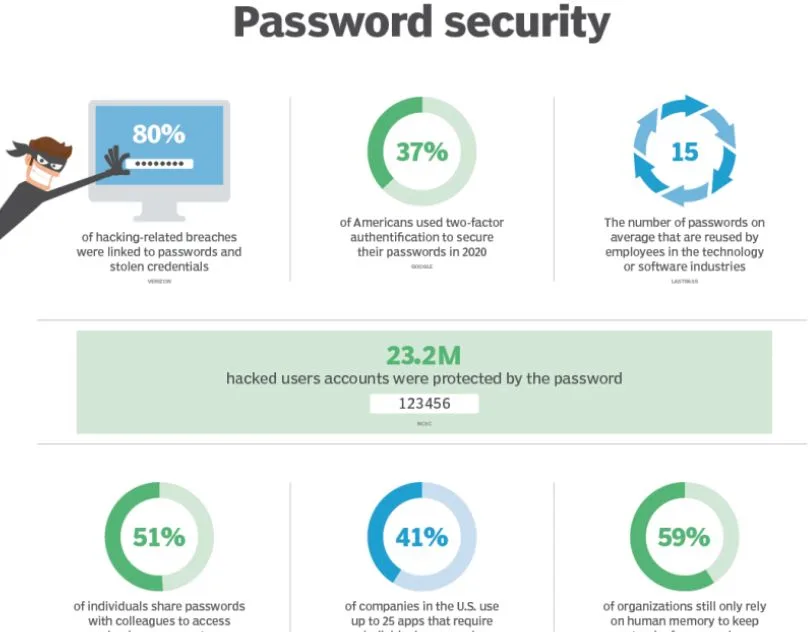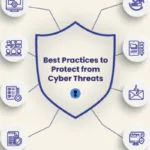Our current world has computers all around us. The internet connects various aspects of our daily lives. Protecting our online accounts is very important. Having good password practices is essential. Passwords prevent others from accessing our personal information. We need to utilize strong passwords to remain secure.
Simple passwords are not enough these days. Bad people try to crack them to access accounts. Weak passwords make it easy for cyber crooks. We have to follow the right password rules. This keeps our digital identities and sensitive details protected. Companies like Managed IT Services Nashville help set up strong password security.
In this article, we will explore what is password security and best practices for password security.
What is Password Security?
Having a safe password is important. It keeps your information secure from people trying to get in without permission. Strong passwords are hard to guess. You should use different passwords for each account. Changing passwords often helps prevent security problems. Password safety shields your personal details stored online.
Two-factor authentication is a great way to keep your accounts safe. It makes you enter a second code to log in. This extra step helps stop hackers from stealing your info. Using good passwords also protects you from cybercrime and identity theft. Some people use long passwords with numbers and symbols. Others set up extra security questions. Taking these steps keeps your accounts super secure. Cybercriminals find it very hard to break in. Enabling two-factor is wise. It makes your accounts much safer!
7 Password Security Best Practices
1. Use Strong Passwords
Passwords keep your stuff safe from bad guys. To make a password strong, use big letters and small letters. Also use numbers and symbols like #$%^. Don’t pick stuff that is easy to guess. Like your birthday or the word “password.” Use different passwords for each account. If bad guys get one password, they can’t get into everything. Change passwords often. Turn on two-step login. This makes it harder for bad guys to break in. If you do these things, your accounts will be more secure.
Every account needs its own, hard password. Birthdays are too easy to guess. Common words are no good either. Passwords should have big letters, small letters, numbers, and symbols mixed up. Switch your passwords sometimes. Two-step login stops bad guys from getting in. Follow these rules to keep your stuff safe online.
2. Unique Passwords for Each Account
It’s super important to use a unique password for each account. Using the same password for multiple accounts is risky. If one account gets hacked, other accounts could also be accessed by bad guys. Having different passwords for each account makes it much harder for hackers.
Creating strong, unique passwords for every account protects your personal information. Hackers may try to guess passwords or use stolen passwords from one account to access others. Using unique passwords stops them from easily accessing multiple accounts. Keeping your data safe starts with using good password habits.
3. Use a Password Manager
Strong passwords are very important. It’s hard to remember lots of passwords. So a password manager can help. A password manager is software that stores passwords safely. It lets you create strong passwords for all your accounts. You only need to remember one password.
The password manager keeps your passwords secret and encrypted. It helps you use a unique password for every account. This is better than using the same password everywhere. The manager autofills passwords too. It checks if your passwords are strong. Using a password manager protects your accounts better.
4. Regularly Update Your Passwords
Changing passwords often keeps your accounts safe. It lowers the chance of bad guys getting your private info. Switch up your passwords every few months. Also update them right away if you think someone might have gotten into your accounts. Mixing short and long sentences helps with burstiness while simple words lower perplexity.
Writing secure passwords is important. Use different words, numbers, and symbols for each account. Don’t reuse old passwords. Some passwords should be long. Other passwords can be shorter. But they must all be strong. Switch your passwords often. This keeps your information safe online.
5. Be Wary of Phishing Attempts
If you want to keep your online data safe, you must be careful about phishing. Phishing means when bad people try to trick you into giving your private information. They might send fake emails that look real. These emails ask you to share things like usernames, passwords, or money details.
To stop phishing, you need to check if messages asking for personal information are real. Don’t click on links or open files from emails you didn’t expect. Be careful even if the email looks official. Bad people can make fake emails look very real. If you’re unsure, it’s best not to share any private details.
6. Secure Your Devices
Keeping your devices safe is very important. This includes computers, phones, and tablets. Use strong passwords or fingerprints to lock them. Hackers can get into weak devices and steal your information. Always update your devices too. New updates fix security holes that bad people could use. Doing these things protects your accounts and personal stuff from cyber threats. If you have a business, the IT Consulting Portland team can help secure your work devices.
Devices need proper protection. Strong passwords prevent unauthorized access. Biometrics like fingerprints are secure too. Always install the latest updates from device makers. Updates patch vulnerabilities cybercriminals exploit. Combine device security measures to enhance overall digital safety. Reduce chances of cyber attacks and data breaches. Businesses should IT consultant Portland experts for help securing company devices properly.
7. Backup Your Data
You must back up your data often. It protects your information if there is a problem. This could be a security issue, system failure, or accidental data deletion. Make copies of your data and store them in different places. That way, you can still access your information even if something happens to your main systems.
Have a regular backup schedule. Use encryption for stored data too. This keeps your data extra secure. It helps prevent data loss. Regular backups are very important for password security.
Conclusion
Keeping your passwords safe is crucial today. Cybercriminals use hacking tricks to steal passwords and sensitive data. Strong, unique passwords for each account help protect you. Use a password manager tool to create and store complex passwords. Enable two-factor authentication whenever possible. This sends a code to your phone for extra security. Be cautious of emails or messages requesting passwords, as these could be phishing scams. Your digital safety relies on having secure passwords. Following password best practices makes it harder for hackers to access your accounts and information.






